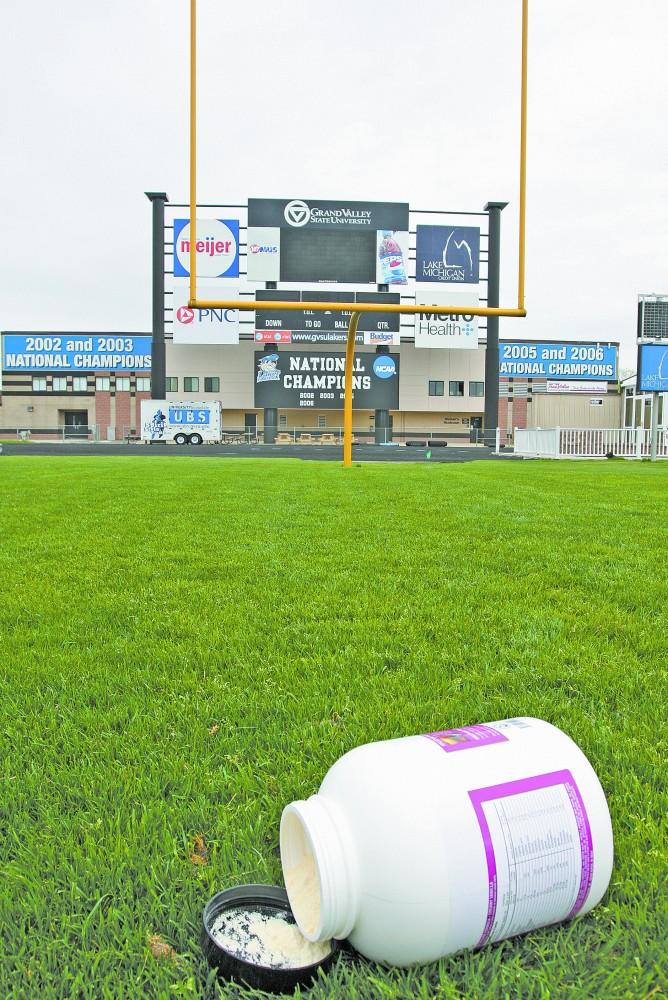Suspended.

GVL / Eric Coulter Some over the counter dietary supplements are banned by the NCAA
May 14, 2011
If you are looking for the quintessential student athlete at Grand Valley State University, you won’t have to look any further than senior football player Zach Breen.
From consistent appearances on the dean’s list to his Dental Admission Test studying – at which the senior is hard at work only a few weeks after the winter semester has ended – Breen has shown that the preseason All-American candidate indeed fits the role of model student athlete.
Unfortunately, one place you won’t be able to find the all-conference defensive back this fall is the football field.
Breen was suspended by the NCAA for testing positive for a banned substance, 1, 3-Dimethylamylamine. The substance, also known as Geranamine, Methylhexaneamine or DMAA, provides regular athletes with a post-workout energy boost and NCAA athletes with a season-long suspension.
Since the initial ruling, Breen’s suspension has been shortened to five games, but the impact it has had on the athletic department is something unseen in GVSU’s history.
“One of the things we’re looking at that we need to do is to try to do the best we can to stay on top of what the banned substances are,” said GVSU Athletic Director Tim Selgo. “That’s not easy, but I think were going to have to continue to educate student athletes better and better.”
While Breen was the first GVSU athlete to test positive for a banned substance, Selgo also hinted at looking into possible changes in the school’s own drug testing policy. The athletic department will now test randomly during the year, usually once every three weeks.
“Generally, I think it’s kind of human nature to see if there’s a way to get better,” said GVSU Head Athletic Trainer Mark Stoessner. “Now, I think we’ll have coaches telling players to make sure that if they are going to take supplements to get them checked out, and they need to understand that they’re doing so at their own risk.”
For Breen, rationalizing what happened took time. From his position as a team leader to the suspension taking place during his senior year, emotions ran wild as he looked for ways adjust and move on, he said.
“I was mad when I heard the news – and I went through the emotional ups and downs – but I honestly didn’t know that I did anything wrong,” said Breen, the team’s second leading tackler last season. “I know what the consequences are, and I’m just grateful that Tim Selgo, coach (Matt) Mitchell and Mark (Stoessener) helped me reduce the suspension.”
The loss of Breen on the field for the season’s first five games will be difficult, but not a death sentence. While Breen and Chris Huley are the only seniors in the GVSU secondary, junior Chad O’Shell showed improvement in the spring and should be able to step in and compliment Huley during Breen’s absence.
As a leader on the field, Breen said he looks to teach and lead his younger teammates and, in the case of his suspension, use it as a teaching tool.
“I started tearing up after I heard the news, and I told Coach on the phone, ‘Teach these other kids, and tell them to learn from this,’” he said. “Really, I wanted them to make a lesson out of me.”
Breen said the supplement Jack3d, which has been found to contain the banned substance, has been used by players all across the college football landscape. He said players at Saginaw Valley State University, Northwood University and Central Michigan University – where players have also been suspended by the NCAA – have used it.
“There’s so much out there that you can buy, especially over the counter,” he said. “Now that I know that this one supplement had something banned in it, who’s to say what is good to take and what’s not?”
Since Breen’s suspension, the team has banned the use of all over-the-counter supplements. Breen wouldn’t say that the team-wide ban on supplements would deter their progress on the field this season, but he said it would have an adverse effect on the general athletic and physical recovery of teammates.
“A lot of these guys don’t have the resources to have steak meals or chicken dinners every night after working out or practicing,” Breen said. “Bad diets don’t introduce those good nutrients, but I don’t think we’d be at a disadvantage- I would say we’re just going to have to work that much harder.”

























